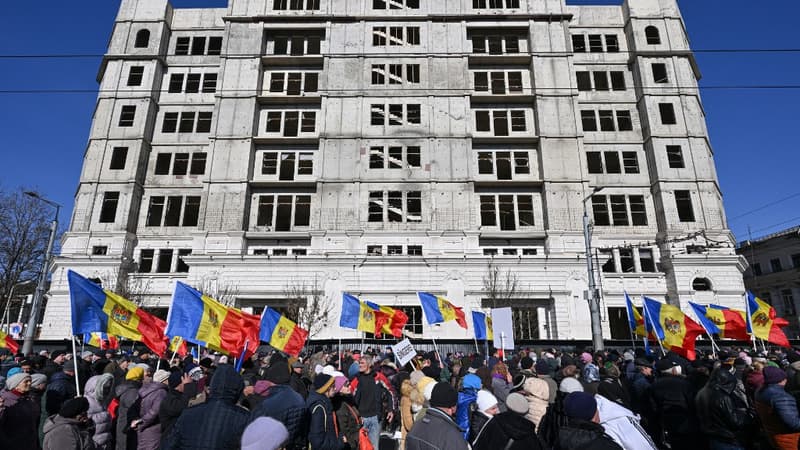Tensions continue to rise between Moscow and Chisinau. Fears have reignited in recent weeks in Ukraine’s neighboring former Soviet republic, whose European ambitions are viewed with suspicion by the Kremlin.
On Monday, Moldovan Defense Minister Anatolie Nosatii stated that “there was no imminent military danger against Moldova at this time.” “But there are other types of risks that affect security,” he told AFP.
He referred to “misinformation, tensions in society generated by Russia”, “a set of provocations” aimed at sowing chaos and “changing the political order”.
Destabilization actions
Police announced Tuesday the arrest of members of a network they suspect is orchestrated by Moscow. The suspected rioters are accused of wanting to destabilize the country by intervening during anti-government demonstrations that regularly rock the Moldovan capital.
The investigators explained that they acted after having “received information about the organization by the Russian secret services of destabilization actions in our territory through demonstrations.”
The country has recently experienced a wave of protests against the pro-European government. Formerly in Russia’s hinterland, Moldova is now ruled by authorities resolutely committed to European integration. The European Union also granted candidate status for membership of the bloc of 27 to both Ukraine and Moldova in June.
Ahead of a new demonstration this Sunday in the capital, Chisinau, border controls had been tightened: a total of 182 foreign citizens were banned from entering during the week, including “a possible member” of the Russian paramilitary group Wagner, police wrote. it’s a statement. .
“Overthrow the government”
Moldova’s pro-European President Maia Sandu, on the basis of documents intercepted by Ukrainian secret services, accused Russia in mid-February of fomenting a coup to overthrow power there.
Rumors of a coup are fueled by the party of fugitive pro-Russian oligarch Ilan Shor, suspected by police of paying protesters or at least reimbursing their travel expenses to protest sites. Moldova has also called on the EU to impose sanctions on Moldovan oligarchs accused of helping Russia destabilize the country.
The country is not facing an “imminent military danger” but rather a “hybrid war” led by Moscow to “overthrow the Europeanist power”, the Defense Minister estimated on Monday in an interview with AFP.
Russia last month denied any coup plans, decrying claims “absolutely baseless and without evidence.”
United States to “thwart Russian plans”
For its part, the United States lent its support to Chisinau. The White House has accused Moscow of “seeking to weaken the Government of Moldova”, with the aim of installing a government committed to its cause.
“We believe that Russia is seeking to weaken the Moldovan government, certainly with the ultimate goal of seeing a more supportive administration,” said John Kirby, a spokesman for the US executive’s National Security Council.
“Russian actors, some linked to Russian intelligence, seek to orchestrate protests in Moldova and use them to foment an insurrection against the Moldovan government,” he said.
The United States had announced that it had increased its information sharing with Moldovan leaders so that they “could investigate further” and “thwart Russian plans.”
fear of a new front
In addition to the danger of destabilization in Moldova, this new episode of tensions also fuels fears of a widening of the conflict between Ukraine and Russia.
Last February, Moldova said it was threatened militarily by Russia. The prime minister of this small country to the east of Ukraine assures that Moscow has a plan to take control of the airport of Chisinau, the capital. The objective would therefore be to move troops there, before opening a new front in western Ukraine.
Since Russia launched its offensive, there has also been regular speculation about the opening of a new front from Transnistria towards the main southern Ukrainian port city of Odessa.
The problem of Transnistria
Moldova also has to deal with the situation in Transnistria. When the USSR disintegrated, this predominantly Russian-speaking region of Moldova unilaterally proclaimed its independence after an armed conflict and the intervention of the Russian army.
Today, at least 1,500 Russian soldiers are stationed there, along with large stores of ammunition. On Thursday, pro-Russian separatist authorities in the region said they had thwarted an attempted attack on several senior officials. They asked the UN to investigate these facts, attributed to kyiv.
The security services of Ukraine (SBU) immediately called the accusations a “Kremlin-orchestrated provocation.” However, these accusations prove that unrest is in full swing in the region.
growing tensions
Tensions between Russia and Moldova, which shares a border with Ukraine, have risen sharply since the start of the war. The former Soviet republic has repeatedly denounced the intrusion into its airspace of Russian missiles against Ukraine and the discovery of missile fragments on its territory.
In addition, in this “hybrid war”, the economic aspect plays an important role. Chisinau has been denouncing “Russia’s energy blackmail” for several months, which has halved its gas deliveries, according to Anatolie Nosatii
In early March, the Moldovan Parliament adopted a declaration condemning the Russian invasion of Ukraine. In response, Russia called on Moldova to end its “confrontational anti-Russian rhetoric.”
Last month, Russian Foreign Minister Sergei Lavrov responded that “Moldova was considered” when asked which countries might follow the same path as Ukraine.
Source: BFM TV


